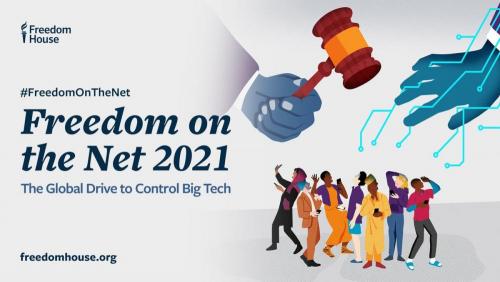
https://freedomhouse.org/report/freedom-net/2021/global-drive-control-bi...
Key Findings
Global internet freedom declined for the 11th consecutive year. The greatest deteriorations were documented in Myanmar, Belarus, and Uganda, where state forces cracked down amid electoral and constitutional crises. Myanmar’s 14-point score decline is the largest registered since the Freedom on the Net project began.
Governments clashed with technology companies on users’ rights. Authorities in at least 48 countries pursued new rules for tech companies on content, data, and competition over the past year. With a few positive exceptions, the push to regulate the tech industry, which stems in some cases from genuine problems like online harassment and manipulative market practices, is being exploited to subdue free expression and gain greater access to private data.
Free expression online is under unprecedented strain. More governments arrested users for nonviolent political, social, or religious speech than ever before. Officials suspended internet access in at least 20 countries, and 21 states blocked access to social media platforms. Authorities in at least 45 countries are suspected of obtaining sophisticated spyware or data-extraction technology from private vendors.
China ranks as the worst environment for internet freedom for the seventh year in a row. Chinese authorities imposed draconian prison terms for online dissent, independent reporting, and mundane daily communications. The COVID-19 pandemic remains one of the most heavily censored topics. Officials also cracked down on the country’s tech giants, citing their abuses related to competition and data protection, though the campaign further concentrated power in the hands of the authoritarian state.
The United States’ score declined for the fifth consecutive year. False, misleading, and manipulated information continued to proliferate online, even affecting public acceptance of the 2020 presidential election results. The new administration took promising steps to enforce stronger protections for internet users.
State intervention must protect human rights online and preserve an open internet. The emancipatory power of the internet depends on its egalitarian nature. To counter digital authoritarianism, democracies should ensure that regulations enable users to express themselves freely, share information across borders, and hold the powerful to account.
The Global Drive to Control Big Tech
In the high-stakes battle between states and technology companies, the rights of internet users have become the main casualties. A growing number of governments are asserting their authority over tech firms, often forcing the businesses to comply with online censorship and surveillance. These developments have contributed to an unprecedented assault on free expression online, causing global internet freedom to decline for an 11th consecutive year.
Global norms have shifted dramatically toward greater government intervention in the digital sphere. Of the 70 states covered by this report, a total of 48 pursued legal or administrative action against technology companies. While some moves reflected legitimate attempts to mitigate online harms, rein in misuse of data, or end manipulative market practices, many new laws imposed excessively broad censorship and data-collection requirements on the private sector. Users’ online activities are now more pervasively moderated and monitored by companies through processes that lack the safeguards featured in democratic governance, such as transparency, judicial oversight, and public accountability.
The drive toward national regulation has emerged partly due to a failure to address online harms through self-regulation. The United States played a leading role in shaping early internet norms around free speech and free markets, but its laissez-faire approach to the tech industry created opportunities for authoritarian manipulation, data exploitation, and widespread malfeasance. In the absence of a shared global vision for a free and open internet, governments are adopting their own approaches to policing the digital sphere. Policymakers in many countries have cited a vague need to retake control of the internet from foreign powers, multinational corporations, and in some cases, civil society.
This shift in power from companies to states has come amid a record-breaking crackdown on freedom of expression online. In 56 countries, officials arrested or convicted people for their online speech. Governments suspended internet access in at least 20 countries, and 21 states blocked access to social media platforms, most often during times of political turmoil such as protests and elections. As digital repression intensifies and expands to more countries, users understandably lack confidence that government initiatives to regulate the internet will lead to greater protection of their rights.










Add new comment